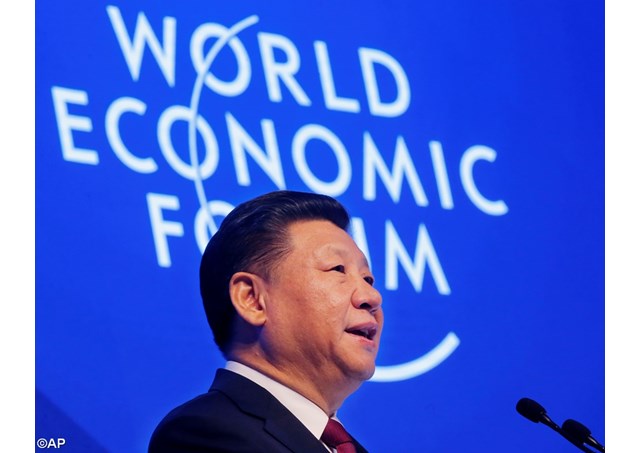
Davos: Oxfam calls for action against inequality

(Vatican Radio) As top political and business leaders gather in Davos for the annual World Economic Forum, a report by Oxfam - the international aid and development agency – calls for their attention with its claim that the gap between the rich and the poor is far greater than feared.
The World Economic Forum runs from Tuesday to Friday in Switzerland, and sees the participation of decision makers and world leaders – including Xi Jinping, the first Chinese President ever to attend the Forum.
In its timely report, released one day before the start of the summit and based on data from Forbes and the annual Credit Suisse Global Wealth datebook, Oxfam calls for a crackdown on tax evasion and a shift away from shareholder capitalism that disproportionately favours the rich.
It also echoes Pope Francis’ reiterated call for a global economic system that puts the human person at the center.
Linda Bordoni spoke to Max Lawson, Head of Inequality Policy at Oxfam about the report.
Eight richest men have as much wealth as the poorest half of the world
Max Lawson explains that new data show that the bottom three and a half billion people in the world – “that’s the bottom half of humanity” – have the same amount of wealth as the eight richest billionaires in the world (and who are all men).
“So eight people have the same wealth as the bottom half of humanity” he says.
Lawson also reveals that the report finds that other measures of inequality are increasing across the world and that the gap between the super-rich and the rest of the population is a problem both in rich nations and in the poorest countries.
He disagrees with the argument that the welfare of the poor is improving and says that data shows that the wealth of the world’s poor is actually lower than we thought.
“What we have seen is a reduction in income poverty meaning that there are less people living on 2 dollars a day than there were 30 years ago, so in this sense there has been real progress, but what we are also seeing is the impact of inequality on that progress” he says.
Lawson says the World Bank and other economic experts are saying that continued progress in reducing the numbers of poor people will not continue “unless we start closing the gap between the runaway rich and the rest of us”.
Inequality not inevitable
Oxfam, he says, believes that the inequality we are seeing is not inevitable: “there are concrete steps that governments can take to make a real difference”.
He points to some good examples such as the course undertaken by the government in Namibia which has increased taxes for the rich and is spending the extra money on free secondary education for all.
“Both steps that can make a big difference in closing that gap” he says.
Lawson says that across the world the richest are continuing to use tax havens to hide their wealth resulting in the fact that ordinary workers can end up paying higher rates of taxes than a billionaire. This situation, he says, must be turned around to be able to make the world a more equal place.
Davos must increase the pressure for change
He expresses his view that the summit at Davos is an occasion to focus on this situation of extreme inequality and to put pressure on the richest people in the world to do something about it.
Lawson says that, particularly taking into consideration some major issues and trends affecting the world today (from migration, to populist trends) a very large proportion of the world’s population feels ‘left behind’ and angry, and he says they are looking for scapegoats instead of the right solutions.
“It’s the fault of a broken economic system. And by tackling that system and making sure that more of that wealth is spread more evenly to ordinary people, I think you’ll see a lot less interest in racism and in blaming others when we have a more fair world where wealth is better distributed” he says.
Lawson agrees that in fact the middle class is also increasingly bearing the brunt of inequality with the ‘super rich’ shooting ahead in the last 30 years “and the top 1% now earning more than everyone else in the world put together”.
So, he says, this is a problem that is impacting ordinary workers across the globe, and especially women who are in some of the lowest paid, precarious employment.
Women at the bottom of the ladder
“It’s always men who are the richest and are at the top while women are the poorest. So we really need to see action to redress that balance and get back to a more even society that will benefit everybody” he says.
Lawson concludes pointing out that Pope Francis’ voice on the inequality issue has been absolutely invaluable: “we share his vision for a more human economy”.
The force of Pope Francis' call for economic system that puts humans at the center
“We believe that humanity has the talent, the imagination and the ability to build a much better world; we should not be happy with the world we are in – this isn’t the best we can do” he says.
We have the resources to make it a lot fairer, Lawson says: “so we share his vision that we must fight inequality and also believe that we have the possibility of humanity of doing a lot better than this.”
| All the contents on this site are copyrighted ©. |


